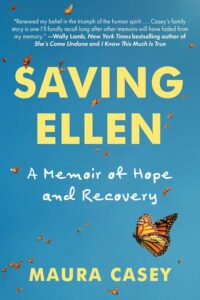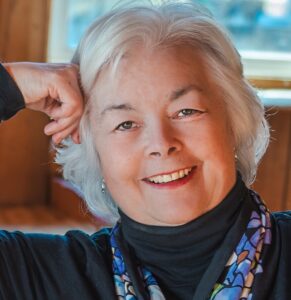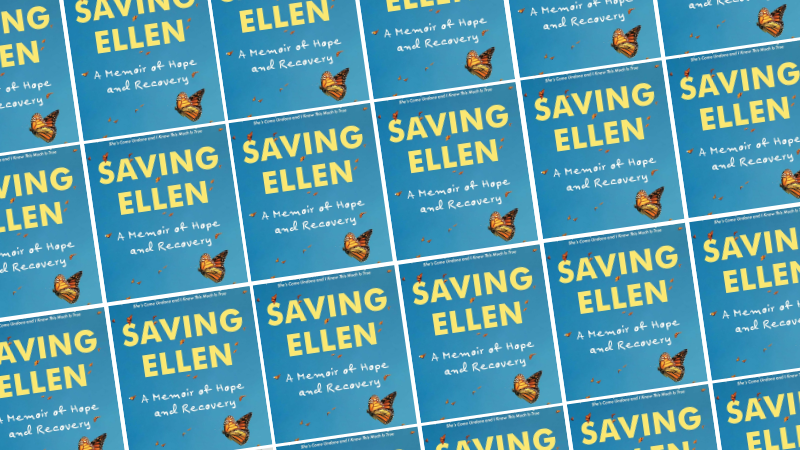NYT opinion writer Maura Casey tells of her family’s journey from chaos to grace
 In her debut memoir, “Saving Ellen: A Memoir of Hope and Recovery” (Skyhorse Publishing, April 1, 2025), journalist Maura Casey crafts a vivid and poignant narrative of a working-class family’s resilience in the face of a terminal diagnosis.
In her debut memoir, “Saving Ellen: A Memoir of Hope and Recovery” (Skyhorse Publishing, April 1, 2025), journalist Maura Casey crafts a vivid and poignant narrative of a working-class family’s resilience in the face of a terminal diagnosis.
Financial privation and her father’s drunken scenes formed the backdrop to Casey’s childhood, but her sister Ellen’s years-long struggle with kidney disease consumed her whole family. Determined to see Ellen live to adulthood, her mother fought medical advice to donate a kidney at a time when organ transplants were medical miracles. She concealed the true impact of that decision, which would affect their large Irish family for years to come.
Set in Buffalo amidst the tumult of the 1960s and 70s, “Saving Ellen” traces the author’s recovery from alcoholism and sexual assault and tells of her irrepressible older sister Ellen, who fought to claim her dream of becoming an athlete; her smart, feminist mother, whose World War II Army service prepared her to manage her own platoon of six children; and her adulterous, alcoholic father who, at the end, was haunted by his shortcomings and regrets. Despite hard truths, “Saving Ellen” is ultimately a story of humor at unexpected moments as well as the grace of reconciliation and gratitude.
“Saving Ellen: A Memoir of Hope and Recovery”
Maura Casey | April 1, 2025 | Skyhorse Publishing | Memoir
Hardcover | ISBN: 978-1-5107-8077-4 | $32.99
 Maura Casey grew up in an Irish-American family in Buffalo, New York, the youngest of six children. For more than 30 years, Casey was an opinion writer for three New England newspapers and The New York Times, where she had a seat on the exalted Times editorial board. Over the course of her career, Casey won 45 state, regional and national awards for her writing. She and her husband Pete have two adult children and two grandchildren. They live on a small Connecticut farm with their two dogs and a barn cat. Casey writes a weekly column, Casey’s Catch, (https://maurac.substack.com), and when the breeze is right, she coasts on Long Island Sound in her sailboat, Second Wind. “Saving Ellen” (Skyhorse Publishing, April 1, 2025) is her first book. Find out more about her at www.caseyink.com.
Maura Casey grew up in an Irish-American family in Buffalo, New York, the youngest of six children. For more than 30 years, Casey was an opinion writer for three New England newspapers and The New York Times, where she had a seat on the exalted Times editorial board. Over the course of her career, Casey won 45 state, regional and national awards for her writing. She and her husband Pete have two adult children and two grandchildren. They live on a small Connecticut farm with their two dogs and a barn cat. Casey writes a weekly column, Casey’s Catch, (https://maurac.substack.com), and when the breeze is right, she coasts on Long Island Sound in her sailboat, Second Wind. “Saving Ellen” (Skyhorse Publishing, April 1, 2025) is her first book. Find out more about her at www.caseyink.com.
Follow Maura Casey on Instagram @author.maura.casey and Substack @maurac
Praise for “Saving Ellen”
“I loved this book: it gives a fascinating insight into an Irish Catholic family in Buffalo in the very early days of renal transplants. As one of Ellen’s doctors, I knew something about the limitations of treatment for kidney failure at the time, and the difficult choices that her family – and Ellen – faced. I was fascinated to hear the whole story, with the domestic turmoil, told with biting humor – and the final reconciliation.”
– Dr. Mary Hawking, sister of theoretical physicist and cosmologist Stephen Hawking
“Saving Ellen broke my heart and renewed my belief in the triumph of the human spirit—sometimes in the same chapter! The Casey family story is one I’ll fondly recall long after other memoirs will have faded from memory.”
– Wally Lamb, author of “She’s Come Undone”
“Saving Ellen is a shimmering memoir of childhood, tender and honest, full of tumult and complicated love. It’s a stunning portrait of an Irish Catholic family, but the heart of the story, and the beauty of how the Caseys love each other through it all, is universal. It’s a brilliant book.”
– Luanne Rice, author of “Last Day” and “The Shadow Box”
“I love this brilliant, stunning, shattering memoir about a complicated, tight-knit family. While reading it, I laughed out loud and I wept. Maura Casey writes masterfully about a mother’s devotion, and a daughter’s evolution into becoming a woman and a writer. Unforgettable.”
– J.Courtney Sullivan, author of “Maine” and “The Cliffs”
“This is a story for anyone who has refused to give up on someone, including themselves. With her skills as a veteran journalist, Casey takes us on a journey through the nooks and crannies of working-class life, which is always hard but full of people who insist on joy, too. With her ever-expanding heart, she helps us find the words for unspeakable grief and the map to forgiveness.”
– Connie Schultz, Pulitzer prize winner and author of “Daughters of Erietown”
An Interview with Maura Casey
“Saving Ellen” explores deeply personal family dynamics, including illness, addiction and recovery. Why did you want to share these intimate details of your family and childhood?
First, I wanted to tell a story. After I read all my diaries from that period I realized they contained a distinct narrative arc, and alcoholism – which affected my family for generations – was part of it. Addiction is a universal disease and struggles with it are nothing new. But through the journals, I could trace the beginning of my own love affair with alcohol starting when I was a teenager. As I wrote, I realized that booze was a character in the book just as much as any member of the family. Without discussing those details, the story would be incomplete.
What was it like growing up in Buffalo, New York, during the 1960s and ‘70s?
When I was growing up, women simply did not have the choices that they have today. Women could not be altar servers or even sing in our church choir. Virtually all sports were closed to women. Jobs women obtained paid little and were sharply segregated by gender. Want ads had skimpy columns of “jobs for women” and far more full columns of “jobs for men.” My sister’s desire to row like our brothers at the West Side Rowing Club, which was closed to women for decades, became a sub-plot of the book.
In your book, you describe your father as deeply flawed but capable of redemption. Did your perspective on him change as you wrote this book?
My father was deeply Catholic, and he knew he screwed up. He never stopped feeling guilty about how he mistreated the family in the throes of his alcoholism. It literally kept him awake many nights. And he was honest with us later, and apologetic. My view of him changed over the years. As I grew older, I became more forgiving. I never envied him or the hell he experienced in the years of remorse he felt.
What do you hope readers will take away from your mother’s story of courage and sacrifice in donating her kidney to your sister, Ellen?
Kidney transplants are now ordinary, but kidney disease is still debilitating. I appreciate all that patients and their donors go through. Like my own mom, women everywhere are far more likely to donate than men. (Source: “When Death becomes Life: Notes from a Transplant Surgeon” by Joshua Mezrich, MD, page 297)

A former award-winning journalist with national exposure, Marissa now oversees the day-to-day operation of the Books Forward author branding and book marketing firm, along with our indie publishing support sister company Books Fluent.
Born and bred in Louisiana, currently living in New Orleans, she has lived and developed a strong base for our company and authors in Chicago and Nashville. Her journalism work has appeared in USA Today, National Geographic and other major publications. She is now interviewed by media on best practices for book marketing.


